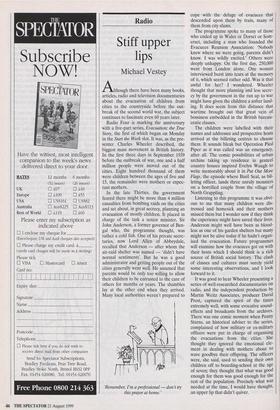Radio
Stiff upper lips
Michael Vestey
Athough there have been many books, articles, radio and television documentaries about the evacuation of children from cities to the countryside before the out- break of the second world war, the subject continues to fascinate even 60 years later.
Radio Four is marking the anniversary with a five-part series, Evacuation: the True Story, the first of which began on Monday in the Start the Week slot. It was, as the pre- senter Charles Wheeler described, the biggest mass movement in British history. In the first three days in September 1939 before the outbreak of war, one and a half million people were moved out of the cities. Eight hundred thousand of them were children between the ages of five and 15, the remainder were mothers or expec- tant mothers.
In the late Thirties, the government feared there might be more than 4 million casualties from bombing raids on the cities and set about, in great secrecy, planning an evacuation of mostly children. It placed in charge of the task a senior minister, Sir John Anderson, a former governor of Ben- gal who, the programme thought, was rather a cold fish. One of his private secre- taries, now Lord Allen of Abbeydale, recalled that Anderson — after whom the air-raid shelter was named — 'didn't have normal sentiments'. But he was a good administrator and getting people out of the cities generally went well. He assumed that parents would be only too willing to allow their children to be entrusted to the care of others for months or years. The shambles lay at the other end when they arrived. Many local authorities weren't prepared to Remember, I'm a professional — don't try this prayer at home.' cope with the deluge of evacuees that descended upon them by train, many of them from city slums.
The programme spoke to many of those who ended up in Wales or Dorset or Som- erset, including a man who founded the Evacuees Reunion Association: 'Nobody knew where we were going, parents didn't know. I was wildly excited.' Others were deeply unhappy. On the first day, 250,000 went from London alone. One woman interviewed burst into tears at the memory of it, which seemed rather odd. Was it that awful for her? I wondered. Wheeler thought that more planning and less secre- cy by the government in the run up to war might have given the children a softer land- ing. It does seem from this distance that wartime brought out that great vein of bossiness embedded in the British bureau- cratic classes.
The children were labelled with their names and addresses and prospective hosts arrived at the billeting centres to choose them. It sounds bleak but Operation Pied Piper as it was called was an emergency, after all. The comic possibilities of urban urchins taking up residence in genteel country houses inspired Evelyn Waugh to write memorably about it in Put Out More Flags, the episode where Basil Seal, as bil- leting officer, lands three unruly monsters on a horrified couple from the village of North Grappling.
Listening to this programme it was obvi- ous to me that many children were dis- tressed and homesick and their mothers missed them but I wonder now if they think the experience might have saved their lives. Anderson might well have been as blood- less as one of his garden shelters but many might not be alive today if he hadn't organ- ised the evacuation. Future programmes will examine how the evacuees got on with their hosts which I should think is a rich source of British social history. The clash of classes and cultures must surely yield some interesting observations, and I look forward to it.
It was good to hear Wheeler presenting a series of well-researched documentaries on radio, and the independent production by Martin Weitz Associates, producer David Prest, captured the spirit of the times extremely well, with some evocative sound- effects and broadcasts from the archives. There was one comic moment when Penny Starns, an historical adviser to the series, complained of how military or ex-military officers were put in charge of organising the evacuations from the cities. She thought they ignored the emotional ele- ment in dealing with mothers about to wave goodbye their offspring. The officers were, she said, used to sending their own children off to boarding-school at the age of seven; they thought that what was good enough for them was good enough for the rest of the population. Precisely what was needed at the time, I would have thought, an upper lip that didn't quiver.


























































 Previous page
Previous page